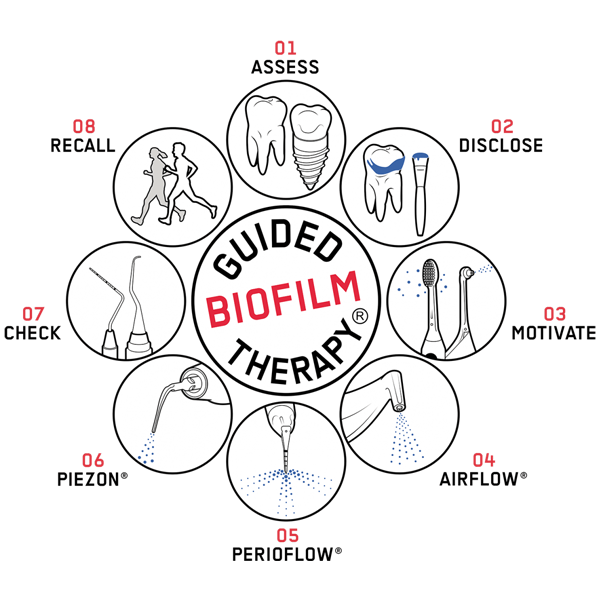We are a Certified Guided Biofilm Therapy (GBT) Dental Practice
Teeth Cleaning
Teeth cleaning is an essential aspect of oral hygiene that helps prevent plaque buildup and other harmful bacteria in the mouth. Regular dental cleanings and daily brushing and flossing are critical in maintaining optimal dental health.
Paisley Dental uses Guided Biofilm Therapy (GBT) to clean our patients’ teeth. GBT is a modern approach based on the sub and supragingival biofilm removal using air-polishing technology with AIRFLOW® PLUS Powder.
Teeth cleaning is an essential aspect of oral hygiene that should not be overlooked. Regular dental cleanings, along with daily brushing and flossing, can help prevent gum disease, tooth decay, and other oral health issues. If you have not had your teeth cleaned recently, it is important to schedule an appointment with your hygienist to ensure that your oral health is in good condition.

How often should you have your teeth cleaned?
Most dental professionals recommend having your teeth cleaned every six months. However, the frequency of your cleanings may vary depending on your individual needs. If you have a history of gum disease or other oral health issues, your dentist may recommend more frequent cleanings.
Teeth cleaning is a process that involves removing the buildup of plaque and tartar from the teeth and gums. Plaque is a sticky, colorless film of bacteria that forms on the teeth and gums. If not removed, it can harden into tartar, which is a hard, yellow or brown deposit that cannot be removed by brushing alone.
Teeth cleaning is essential because it helps to prevent the buildup of harmful bacteria in the mouth, which can lead to gum disease and tooth decay. Gum disease is a serious condition that can lead to tooth loss and other health problems if left untreated. Regular dental cleanings, along with daily brushing and flossing, can help prevent gum disease and other oral health issues.
During a teeth cleaning appointment, a dental hygienist will use special tools to remove plaque and tartar from your teeth and gums. They will also check for signs of gum disease and other oral health issues. The process typically involves the following steps:
- Examining the teeth and gums: The hygienist will examine your teeth and gums to check for any signs of gum disease, cavities, or other issues.
- Removing plaque and tartar: The hygienist will use special tools to remove the plaque and tartar from your teeth and gums.
- Cleaning and polishing the teeth: After the plaque and tartar have been removed, the hygienist will clean and polish your teeth to remove any remaining stains and give them a smooth, shiny finish.
- Applying fluoride: Finally, the hygienist may apply fluoride to your teeth to help prevent tooth decay.
There are several benefits to having your teeth cleaned regularly. These include:
- Prevention of gum disease: Regular dental cleanings can help prevent gum disease by removing the buildup of plaque and tartar from the teeth and gums.
- Prevention of tooth decay: Dental cleanings can also help prevent tooth decay by removing harmful bacteria from the mouth.
- Improved oral health: Regular dental cleanings can help improve your overall oral health and reduce the risk of developing other health issues related to poor oral hygiene.
- Brighter, healthier smile: Dental cleanings can help remove stains from the teeth and leave them looking brighter and healthier.
PAYMENT OPTIONS
We accept most payment methods (Visa, MasterCard, and e-transfers). Additionally, we can assist in facilitating arrangements for flexible Payment Plans.
INSURANCE
Our expert staff is here to help!
We work with most major Dental Insurance Providers. We use the latest technology to facilitate fast transfer on your behalf, and our knowledgeable staff will work hand-in-hand with you to maximize reimbursements due to you for covered procedures.
